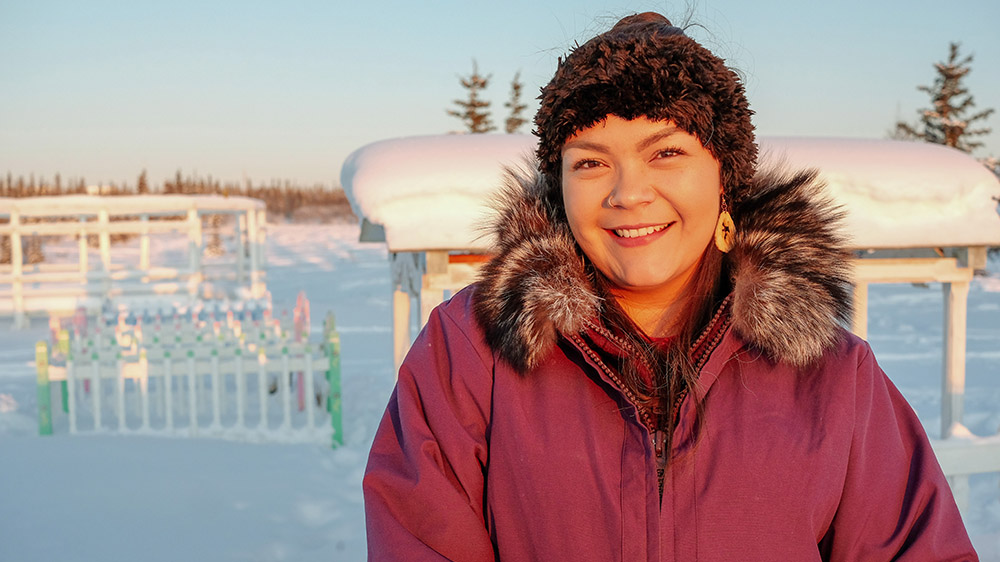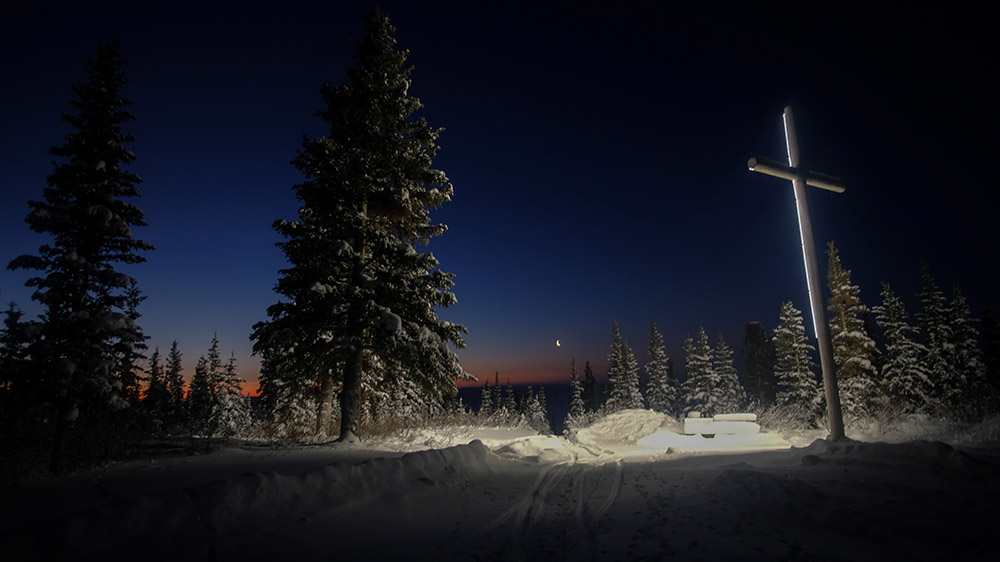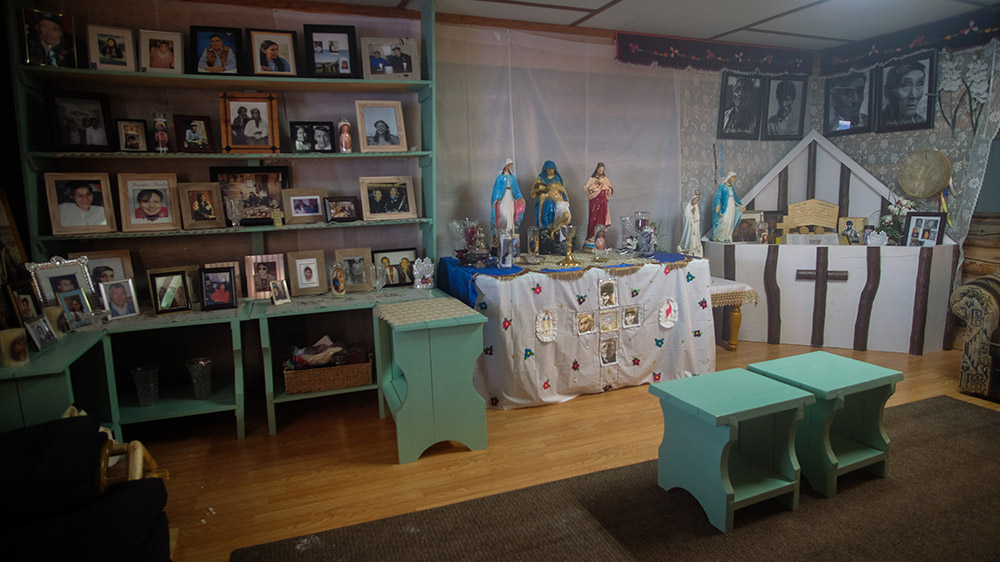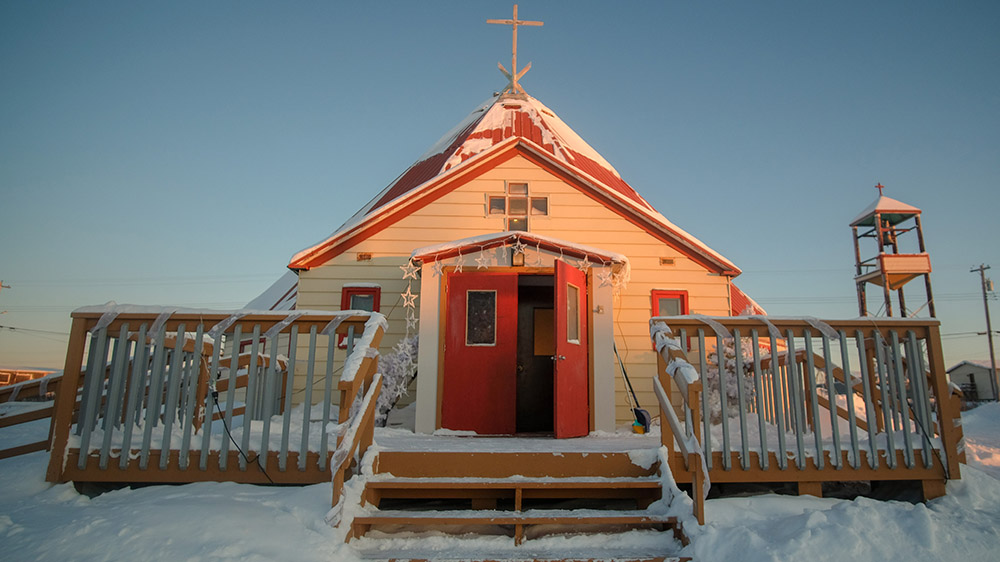Mandy Bayha has her grandmother’s hands.
She wrote about them in Dene Heroes of the Shatu Volume Four that came out in January.
The books are a collection of oral histories.
“It’s a story about how we are so loved. Physically they look just looks exactly like my grandmothers,” Bayha said. “That knowledge that was in my grandmother’s hands whether it is sewing, cooking or preparing these things, because she taught me those things that knowledge now belongs in my hands and she passed them to me,”
Bayha was raised by a single mum and her grandparents, who instilled a deep understanding of Sahtúot’ine – Great Bear Lake People and their spirituality.
She and other community members sat down with APTN News to discuss the spirituality north of 60.
The relationship between oneself to others
Bayha is one of roughly 530 who live in Délı̨nę (meaning where the water flows) a small community in the Sahtu region of Denendeh – the Northwest Territories.
Each family comes from a traditional territory around the lake travelling the water for trout, and the land for caribou.
She’s a mother of two, an activist and advocate for the preservation of land and culture and the Indigenous healing coordinator for the Deline Got’ine Government.
Bayha said the relationship between oneself to others involves respect and responsibility in their collective knowledge of the ecological diversity around the Sahtu.
“In this way, I think our family system reflect the lands we come from, and it makes us diverse,” she said. “Every family is responsible for teaching and passing down traditional knowledge and knowledge of the areas and as a whole, the protocols, laws and things.”
(‘I think our family system reflect the lands we come from’ says Mandy Bayha. Photo: Charlotte Morritt-Jacobs/APTN)
Dene laws are natural laws, with the people moving with the environment and never against it.
Bayha noted the relationship with the land has influenced reciprocity and sharing among her people with her ancestors often referring to the land as “mother.”
“Not only did we depend on the land to survive for food for shelter, but we also had a special relationship with the land as you would your own mother,” she said. “Your mother nurtures you, cares for you, provides for you.
“Whatever the land gives us we are grateful. And whatever we are given from the land we are given another day. So every day and every moment in the lives of our ancestors was a prayer.”
The relationship between oneself and the Creator
(This cross greets visitors to the community every day. Photo: Charlotte Morritt-Jacobs/APTN)
Bayha explained how holistic and interconnected the spiritual beliefs are, which circle around values of justice, unity and love.
“The concept that we are spiritual beings having human experiences is really prominent in our culture and way of life. I think that really has to do with what our ancestors went through – a lot of hardships to survive, especially in a harsh climate,” Bayha said.
She said In her opinion, this provided a beautiful context for gratitude and that every day that passed was a living prayer.
Délı̨nę and the Prophets
(Inside the Prophet’s house ‘I have been visiting here for a long while,’ says Bayha. Photo: Charlotte Morritt-Jacobs/APTN)
The door’s always open to the Prophet’s house and used by those like Candice Ferdinand who comes to center herself.
“I have been visiting here for a long while. I feel connected along with call of those photos of the Elders and individuals in the photos. I feel like they are all heal with us in prayer,” she said, showing APTN inside the old log building decorated in photographs candles and a shrine to well-known Dene prophets.
She points out some old weathered photos of her mother, grandma and grandpa, Etsie Rosa and Etsah Lousie.
Ferdinand is soft spoken, but passionate about listening and helping others.
She recently graduated from Aurora College’s social work program in Yellowknife and moved back home to Délı̨nę, where she plans on rooting herself in traditional knowledge and spirituality.
“I noticed in college that the western education system kind of shapes you into a know-it-all attitude. The Elders here won’t do that, they are humble, that is the behaviour I learned, to know you don’t know everything and you are learning,” Ferdinand said.
(‘I noticed in college that the western education system kind of shapes you into a know-it-all attitude,’ says Candice Ferdinand. Photo: Charlotte Morritt-Jacobs/APTN)
Like Bayha, she has many fond memories of being raised by her grandparents. Her Ama- grandmother would tell her stories every night before bed. She said this value of Elders and oral storytelling has kept her community grounded in traditional knowledge.
Deline and Prophet Ayah
Prophet Louis Ayah’s spiritual guidance is respected protocol.
From 1857 to 19450, he gave more than 30 prophecies to the people of Deline.
He was revered as a visionary around the 1930s and helped teach morality and religion to the people of the Sahtu.
His prophetic capabilities brought folks in from across the north who traveled to listen to him.
Morris Neyelle, is a knowledge holder of the prophesies and from the author of “walking with giants
“He said as a human being we are all the same. You shouldn’t judge people as is, look at the same people as others,” said Neyelle.
(‘Creator gave them their language and beliefs’ says Bayha. Photo: Charlotte Morritt-Jacobs/APTN)
In 1939, the government sent the RCMP to Deline to get predictions on the outcome of World War II.
“He saw two countries face to face, Canada and Germany, not too long and our country overlapped Germany and it disappeared which he said they are powerful but it will be over and won’t last very long,” said Neyelle.
“That was the message he gave.”
Bayha and her kids follow the worn down path her grandfather walked daily.
It leads to the church.
“I asked an Elder form my community here. I told him, ‘there’s so many different religions and we see this all the time, a big religion in our communities in the north is Roman Catholic, but you also have the protestants, all kinds of different religions in the world,’” she said.
“So how do you know which one is right and which is the right one to follow? It was a really beautiful explanation. He said ‘If I wanted to do to Tulita which is just down the river here, I can take a boat, I can walk, I can fly, there’s many different ways of getting to Tulita, different methods to get to Tulita. In religion it’s the same way, there are many different ways of getting there,’” said Bayha.
“Creator gave them their language and beliefs just the same way that we look at these things as gifts to us. Dene people as family groups ever tell other families what to do, what to believe and how to do things as family groups, how society is formed and how we relate to one another. One another in our families, communities and one another as a whole. I think that is really beautiful.”
At five p.m., the church bell would ring and all the Elders would go to the church and pray the rosaries every day.
She said it was really “peaceful and beautiful because of unity and again it is really important to our people to instill those things at a really young age.”
In 2015 Deline signed a first of its kind deal with Canada for self government.
It has law making powers and responsibility over language, culture, education, social services, taxes and spirituality.
Much like the Dene teachings of tolerence, Deline will not be told and not tell others how to worship.














